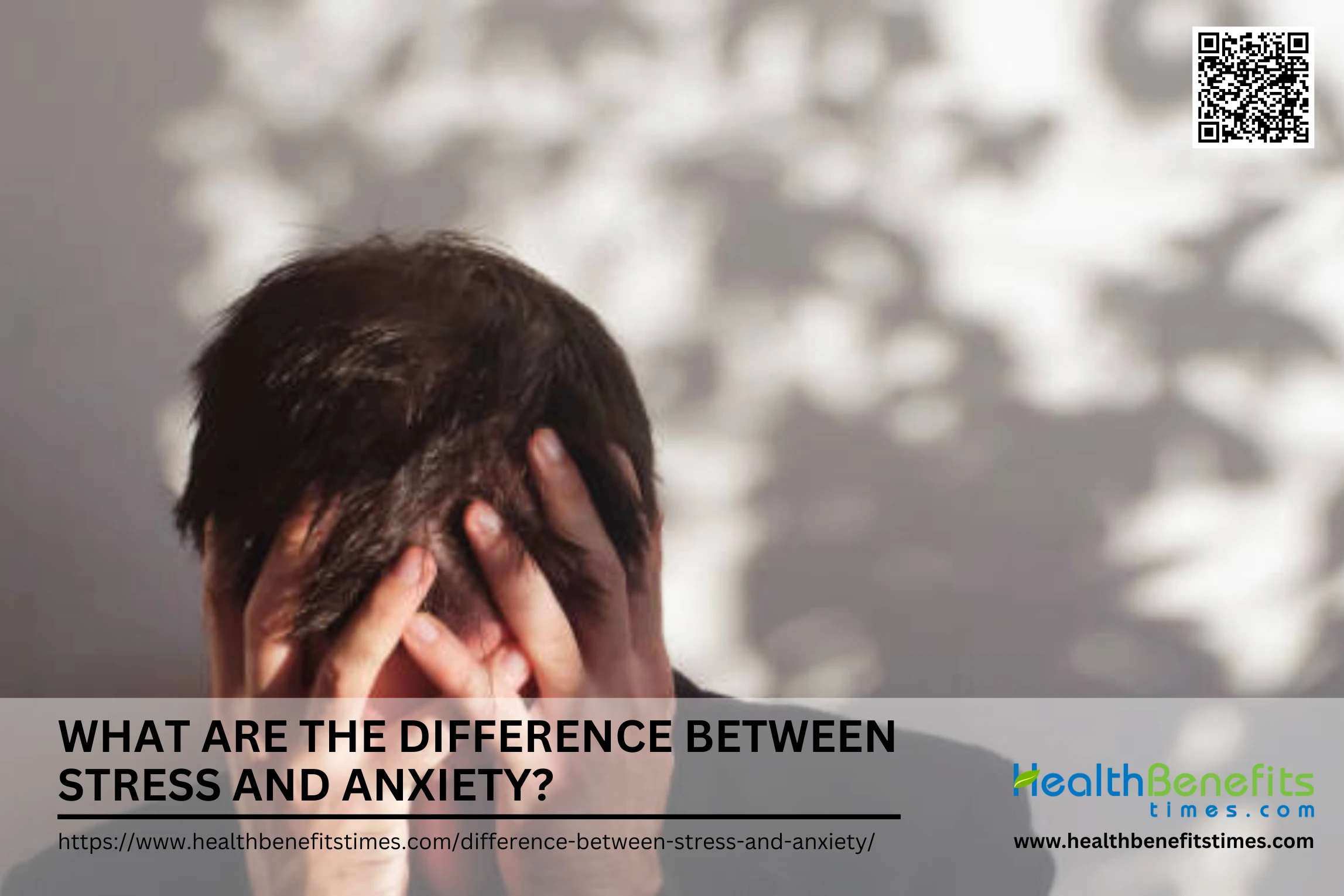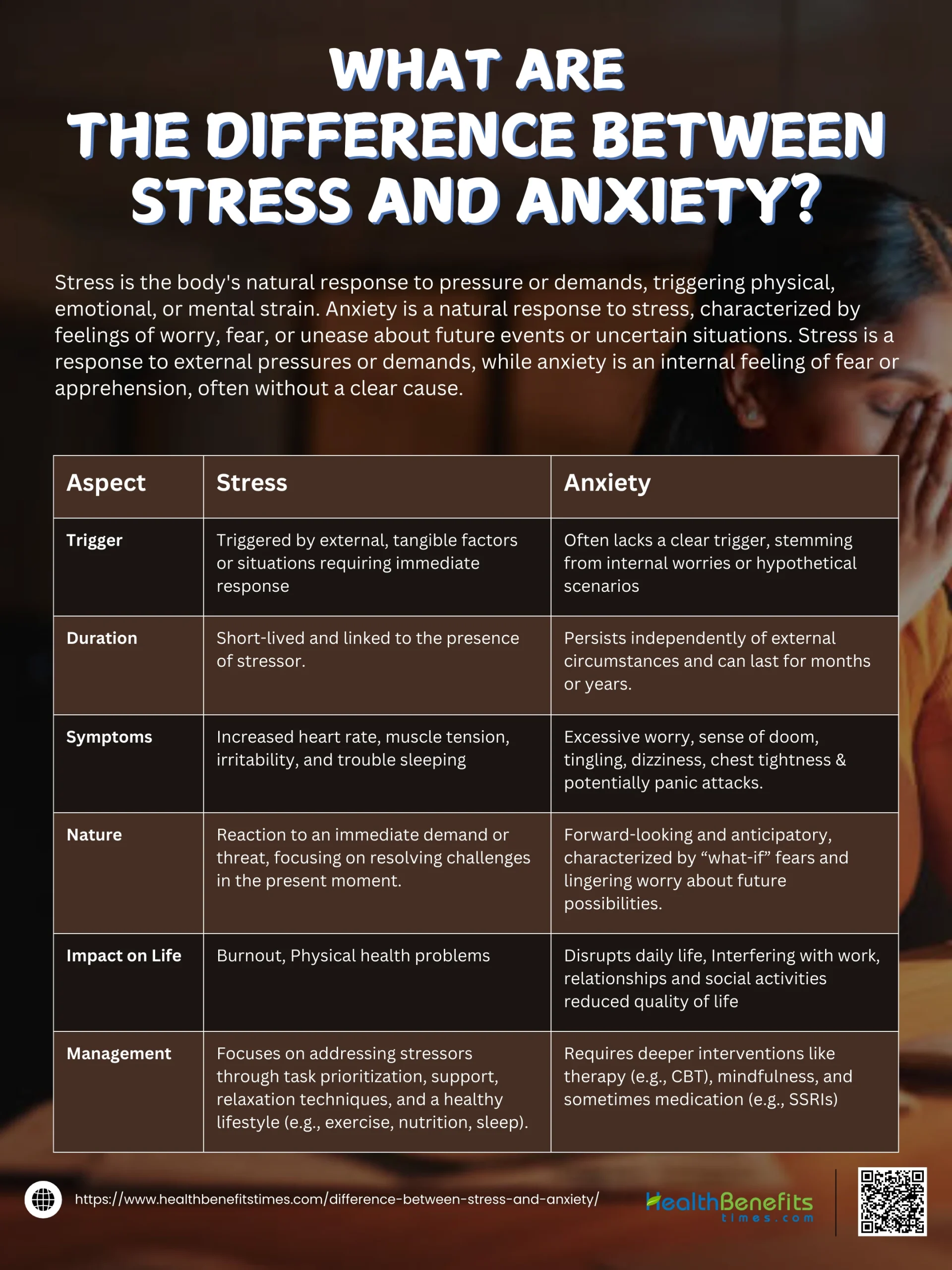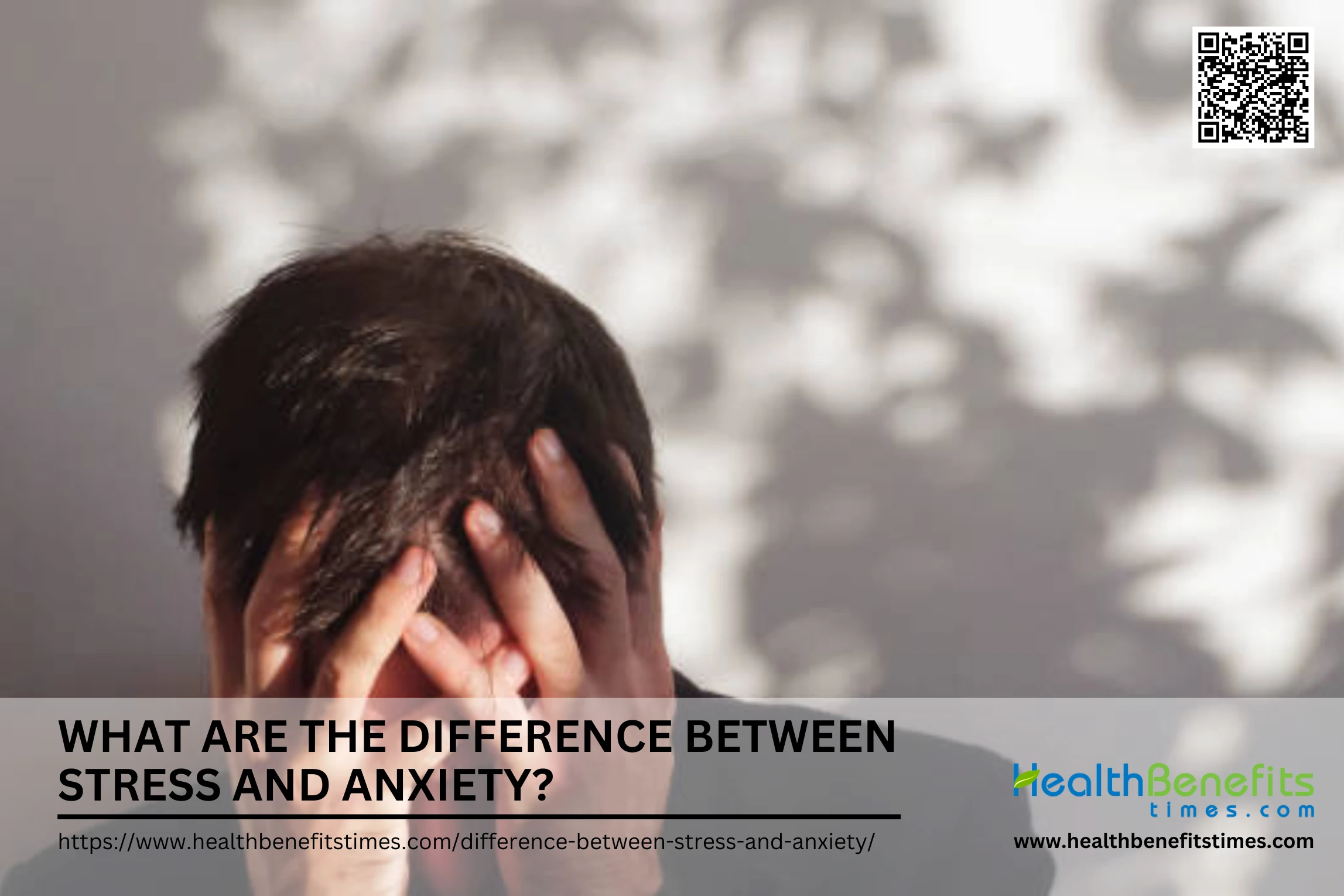- Stress is the body’s natural response to pressure or demands, triggering physical, emotional, or mental strain.
- Anxiety is a natural response to stress, characterized by feelings of worry, fear, or unease about future events or uncertain situations.
- Stress is a response to external pressures or demands, while anxiety is an internal feeling of fear or apprehension, often without a clear cause.
 What is Stress
What is Stress
Stress is the body’s natural response to challenges, pressures, or perceived threats. It can manifest physically, emotionally, or mentally and is typically tied to external circumstances that demand attention or action. While stress can be a positive motivator in some cases, prolonged or unmanaged stress can negatively impact overall health and well-being.
What is Anxiety
Anxiety is an emotional and physical response characterized by excessive fear, worry, or unease about potential or perceived threats, even when no immediate danger exists. While it is normal to experience some level of anxiety in certain situations, such as before a major event, persistent or intense anxiety can interfere with daily life. Unlike stress, which is often tied to an external trigger, anxiety may arise without a clear cause and is marked by ongoing apprehension.
Differences between Stress and Anxiety
Stress and anxiety are closely related but distinct experiences. Stress is typically a reaction to external pressures or demands and resolves once the stressor is addressed. Anxiety, however, involves persistent worry or fear that can occur even in the absence of a clear trigger. Understanding these key differences can help you recognize and manage each more effectively.
1. Trigger
- Stress is commonly triggered by external factors or situations requiring an immediate response. Examples include work deadlines, financial pressures, relationship conflicts, or sudden life changes. These triggers are tangible and often tied to a specific event or circumstance. For example, you might feel stressed about preparing for a presentation or resolving a disagreement with a loved one.
- Anxiety, in contrast, often lacks a clear or immediate trigger. It stems from internal worries or fears, frequently about hypothetical scenarios. For instance, someone might feel anxious about the possibility of losing a job, even when there’s no indication this will happen. Anxiety can also be self-sustaining, with the fear of feeling anxious becoming a trigger in itself.
2. Duration
- Stress is typically short-lived and directly linked to the presence of a stressor. It arises quickly when a challenge is encountered and subsides once the challenge is resolved or no longer relevant. For example, stress from an upcoming exam usually diminishes after the exam is over. Long-term or chronic stress can occur when stressors persist over time, such as ongoing financial struggles or a high-pressure job.
- Anxiety, however, tends to persist independently of external circumstances. It often lasts for extended periods, sometimes months or years, regardless of whether the original cause of worry still exists. This prolonged nature of anxiety can lead to a cycle where anxiety feeds itself, making it harder to break free.
3. Symptoms
- Stress and anxiety share some physical and emotional symptoms, such as increased heart rate, muscle tension, irritability, and trouble sleeping. However, the nuances of these symptoms differ. Stress symptoms are often situational, emerging as a direct response to the stressor. For instance, you might feel tense or have difficulty sleeping the night before a big event. Once the stressor is gone, these symptoms typically fade.
- Anxiety symptoms are more pervasive and can be disproportionate to the situation or even appear without an identifiable cause. They include excessive worry, a sense of impending doom, and physical sensations like tingling, dizziness, or chest tightness. In severe cases, anxiety can escalate into panic attacks, which are sudden episodes of overwhelming fear accompanied by symptoms like shortness of breath, sweating, and a racing heartbeat.
4. Nature
- Stress is fundamentally a reaction to an immediate demand or threat. It’s rooted in the present, focusing on addressing challenges as they arise. This reactive nature makes stress feel manageable, as resolving the stressor often alleviates the stress itself. For instance, finishing a project or resolving a conflict will usually relieve the associated stress.
- Anxiety, on the other hand, is more forward-looking and anticipatory. It is characterized by hypothetical fears and “what-if” scenarios. Anxiety tends to linger even when the immediate situation is resolved or there’s no apparent danger. It’s an internalized state of worry, where the fear of future possibilities often overshadows the reality of the present.
5. Impact on Life
- Stress, in small amounts, can sometimes be motivating. It can push you to meet deadlines, prepare for challenges, or achieve goals. However, prolonged or unmanaged stress can lead to burnout, physical health problems like high blood pressure, and emotional exhaustion. It may also contribute to unhealthy coping mechanisms, such as overeating, substance use, or social withdrawal.
- Anxiety, particularly when severe or chronic, has a more disruptive impact on life. It can interfere with your ability to work, maintain relationships, or enjoy social activities. Anxiety disorders often lead to avoidance behaviors, where individuals withdraw from situations they perceive as anxiety-provoking, further limiting their experiences and quality of life. This can create a cycle of isolation and reduced confidence, making daily functioning increasingly difficult.
6. Management
- Stress management often focuses on addressing the source of stress and adopting strategies to reduce its intensity. Practical steps include prioritizing tasks, seeking support from others, practicing relaxation techniques (like deep breathing, yoga, or mindfulness), and ensuring a healthy lifestyle with regular exercise, balanced nutrition, and adequate sleep. Reducing external pressures can help minimize stress’s impact.
- Anxiety management often requires a more multifaceted approach. While lifestyle changes such as mindfulness and exercise can be helpful, anxiety often needs deeper intervention. Therapy, such as cognitive-behavioral therapy (CBT), helps individuals identify and challenge thought patterns that fuel anxiety. Medication, such as selective serotonin reuptake inhibitors (SSRIs), can also be prescribed in more severe cases. Anxiety management aims to equip individuals with tools to recognize and break cycles of excessive worry, enabling them to regain control over their thoughts and emotions.
 Overlap Between Stress and Anxiety
Overlap Between Stress and Anxiety
Stress and anxiety share many similarities, often making it difficult to distinguish between the two. Both are part of the body’s natural response to perceived challenges or threats and can present with similar physical and emotional symptoms, such as increased heart rate, restlessness, and difficulty concentrating. However, while they overlap in many ways, their causes, duration, and underlying nature differ. Recognizing these commonalities is crucial for understanding how to manage both effectively.
| Aspect | Stress | Anxiety | Overlap |
| Cause | External triggers like deadlines or conflicts | Internal worries, often unrelated to specific events | Both can be triggered by challenging situations |
| Duration | Temporary, resolves when the stressor is removed | Persistent, may linger even without a clear cause | Both can feel ongoing if not managed |
| Symptoms | Physical signs like muscle tension, headaches, and irritability | Emotional signs like excessive worry and dread | Shared symptoms like rapid heart rate and restlessness |
| Impact on Health | Can cause chronic health problems if prolonged | Often leads to mental health conditions if severe | Both can disrupt daily life and well-being |
| Management Techniques | Addressing the source and practicing relaxation | Therapy, medication, and mindfulness practices | Both benefit from stress-reduction techniques like exercise and breathing exercise |
How to Manage Stress
Managing stress effectively involves recognizing its triggers and adopting strategies to reduce its impact on your body and mind. While some stress can be motivating, chronic stress can take a toll on your health if left unmanaged. The key is to incorporate healthy coping mechanisms and make lifestyle adjustments that help you navigate challenging situations with resilience.
- Identify Your Stressors
Take time to pinpoint the specific events, situations, or behaviors causing your stress. Keeping a journal of stressful moments can help you recognize patterns and address recurring triggers. - Practice Relaxation Techniques
Engage in activities like deep breathing, meditation, yoga, or progressive muscle relaxation to calm your mind and reduce physical tension. - Exercise Regularly
Physical activity, such as walking, running, or dancing, helps release endorphins, which improve your mood and act as natural stress relievers. - Maintain a Balanced Diet
Eating a variety of nutritious foods can stabilize your energy levels and improve your overall ability to handle stress. - Prioritize Sleep
Aim for 7-9 hours of quality sleep each night to allow your body and mind to recover from daily stressors. - Set Boundaries and Learn to Say No
Avoid overcommitting yourself by setting realistic expectations and declining requests that add unnecessary pressure. - Stay Connected
Lean on friends, family, or support groups to share your feelings and gain perspective. Social support can help you feel less overwhelmed. - Organize and Plan Ahead
Break large tasks into smaller steps, create to-do lists, and set realistic deadlines to reduce the feeling of being overwhelmed. - Limit Stimulants
Reduce your intake of caffeine, nicotine, and alcohol, which can heighten stress levels and disrupt your sleep. - Engage in Hobbies
Dedicate time to activities you enjoy, such as reading, painting, gardening, or listening to music, to shift your focus away from stressors.
How to Manage Anxiety
Managing anxiety requires a combination of self-awareness, coping techniques, and sometimes professional support. While anxiety is a natural response to fear or worry, persistent or excessive anxiety can interfere with daily life. Learning to identify triggers, develop healthy habits, and adopt calming strategies can help reduce its impact and improve overall well-being.
- Recognize Your Triggers
Identify specific situations or thoughts that tend to cause your anxiety. Keeping a journal can help track patterns and uncover underlying causes. - Practice Mindfulness and Meditation
Focus on the present moment with mindfulness exercises or meditation to quiet anxious thoughts and create a sense of calm. - Incorporate Deep Breathing Exercises
Techniques like diaphragmatic breathing or the 4-7-8 method can slow your heart rate and reduce physical symptoms of anxiety. - Exercise Regularly
Physical activity, such as running, yoga, or swimming, releases endorphins and helps decrease tension associated with anxiety. - Establish a Consistent Routine
Creating regular daily habits can reduce unpredictability, which often exacerbates anxiety. - Limit Caffeine and Sugar
Reduce your intake of stimulants like coffee and sugary snacks, which can amplify anxious feelings and disrupt your mood. - Engage in Calming Activities
Spend time on hobbies or activities you find relaxing, such as drawing, gardening, or listening to music. - Challenge Negative Thoughts
Use cognitive techniques to reframe unhelpful or catastrophic thinking into more balanced and realistic perspectives. - Improve Sleep Hygiene
Prioritize 7-9 hours of quality sleep by establishing a bedtime routine and minimizing screen time before bed. - Seek Social Support
Talk to trusted friends, family members, or support groups about your feelings. Sharing your experiences can provide relief and perspective. - Use Anxiety-Reducing Apps
Leverage mobile apps that guide you through mindfulness exercises, breathing techniques, or cognitive-behavioral therapy strategies.
Conclusion
In conclusion, stress and anxiety are natural responses to life’s challenges, but understanding their differences is crucial for effective management. While stress is typically tied to specific external triggers and often resolves when these are addressed, anxiety can persist and disrupt daily life, even in the absence of clear causes. Both can significantly impact physical and mental health if left unmanaged, but adopting healthy coping strategies, such as mindfulness, exercise, and seeking support, can make a meaningful difference. For more severe cases, professional guidance can provide the tools and treatments necessary to regain control and improve overall well-being. By taking proactive steps, you can navigate stress and anxiety with resilience and maintain a healthier, more balanced life.
FAQs
- Can stress and anxiety affect your immune system?
Yes, chronic stress and anxiety can weaken your immune system. Prolonged stress triggers the release of cortisol, a hormone that, in high levels, can suppress immune function, making you more susceptible to illnesses such as colds, infections, or slower wound healing.
- Is it possible for children to experience chronic stress or anxiety?
Absolutely. Children can experience both chronic stress and anxiety due to academic pressures, family conflicts, bullying, or other environmental factors. Anxiety disorders, such as separation anxiety or social anxiety, are also common in children and may require specialized care.
- How can workplace stress contribute to anxiety disorders?
Workplace stress, particularly from factors like excessive workloads, lack of control, or toxic environments, can escalate into chronic stress. Over time, this can lead to anxiety disorders as the mind and body remain in a heightened state of alertness, even outside of work.
- Can diet influence your stress or anxiety levels?
Yes, diet plays a significant role in managing stress and anxiety. Consuming foods high in sugar, caffeine, or processed ingredients can exacerbate symptoms. Conversely, foods rich in omega-3 fatty acids, magnesium, and antioxidants—like salmon, leafy greens, and nuts—can help stabilize mood and reduce stress.
- How do you differentiate between a panic attack and an anxiety attack?
A panic attack typically comes on suddenly and involves intense physical symptoms like chest pain, shortness of breath, and a sense of impending doom. It may not always have a specific trigger. An anxiety attack, while similar, usually builds gradually in response to a perceived threat and is characterized by heightened worry or fear rather than extreme physical sensations.
